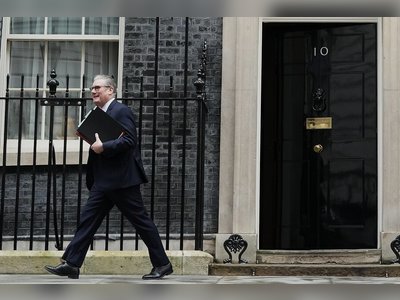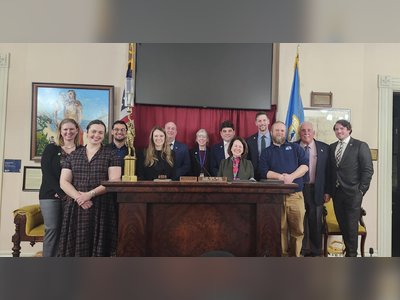Military takes control of Myanmar “for one year”; Suu Kyi reported detained
Myanmar military television said that the military was taking control of the country for one year declared a state of emergency, cites fraud during November’s general election. Many of the country’s senior politicians including Aung San Suu Kyi had been detained. Biden administration warned Myanmar’s military officials that it will "take action". Myanmar reacted: “Nothing to do with America. Back-off and fix your own country”.
A presenter on military-owned Myawaddy TV announced the takeover and cited a section of the military-drafted constitution that allows the military to take control in times of national emergency. He said the reason for takeover was in part due to the government’s failure to act on the military’s claims of voter fraud in last November’s election and its failure to postpone the election because of the coronavirus crisis.
The announcement follows days of concern about the threat of a military coup — and military denials that it would stage one — and came on the morning the country’s new Parliament session was to begin.
The takeover is a sharp reversal of the partial yet significant progress toward democracy Myanmar made in recent years following five decades of military rule and international isolation that began in 1962. It would also be shocking fall from power for Suu Kyi, who led the democracy struggle despite years under house arrest and and won a Nobel Peace Prize for her efforts.
The military’s actions were already receiving widespread international condemnation.
New U.S. Secretary of State Anthony Blinken issued a statement expressing “grave concern and alarm” over the reported detentions.
“We call on Burmese military leaders to release all government officials and civil society leaders and respect the will of the people of Burma as expressed in democratic elections,” he wrote, using Myanmar’s former name. “The United States stands with the people of Burma in their aspirations for democracy, freedom, peace, and development.”
Australian Foreign Minister Marise Payne issued a similar statement, also calling on the military to respect the rule of law and release the leaders it had detained.
The detention of the politicians and cuts in television signals and communication services on Monday were the first signs that plans to seize power were in motion. Phone and internet access to Naypyitaw was lost and Suu Kyi’s National League for Democracy party could not be reached. Phone service in other parts of the country was also reported down, though people were still able to use the internet.
The Irrawaddy, an established online news service, reported that Suu Kyi, who as state counsellor is the nation’s top leader, and the country’s president, Win Myint, were both detained in the pre-dawn hours. The news service cited Myo Nyunt, a spokesman for the NLD.
Its report said that the party’s Central Executive Committee members, lawmakers and regional Cabinet members had also been taken into custody.
A list of other people believed to have been detained, compiled by political activists who asked not to be named for security reasons, included filmmaker Min Htin Ko Ko Gyi, writer Maung Thar Cho, and prominent veterans of the country’s 1988 student protest movement, such as Ko Ko Gyi and Min Ko Naing. Their detention could not immediately be confirmed.
In Yangon, the country’s biggest city, life on the street appeared mostly as usual, as people carried out their normal morning activities, including exercising at a popular park.
Monday’s parliamentary session was to be the first since last year’s election, as tension lingered over recent comments by the military that were widely seen as threatening a coup.
The military, however, maintains its actions are legally justified, though Suu Kyi’s party spokesman as well as many international observers have said it is in effect a coup.
The 2008 constitution, drafted and implemented during military rule, has a clause that says in case there is a national emergency, the president in coordination with the military-dominated National Defense and Security Council can issue an emergency decree to hand over the government’s executive, legislative and judicial powers to the military’s commander-in-chief.
The clause had been described by New York-based Human Rights Watch as a “coup mechanism in waiting.”
It is just one of many parts of the charter that ensured the military could maintain ultimate control over the country at the expense elected politicians. The military also was guaranteed 25% of seats in Parliament and control of several key ministries, especially those involved in security and defense.
The 75-year-old Suu Kyi is by far the country’s most popular politician, and became the country’s de facto leader after her party won 2015 elections, though the constitution barred her from being president. She had been a fierce antagonist of the army during her time under house arrest.
Nevertheless, once in power Suu Kyi had to balance her relationship with the country’s generals and even went on the international stage to defend their crackdown on Rohingya Muslims in the country’s west, a campaign the U.S. and others have labeled genocide. That has left her reputation internationally in tatters.
She remains wildly popular at home, where most supported the campaign against the Rohingya. Suu Kyi’s party captured 396 out of 476 seats in the combined lower and upper houses of Parliament in last November’s polls.
The military, known as the Tatmadaw, has charged that there was massive voting fraud in the election, though it has failed to provide proof. The state Union Election Commission last week rejected its allegations.
Amid the bickering over the allegations, the military last Tuesday ramped up political tension when a spokesman at its weekly news conference, responding to a reporter’s question, declined to rule out the possibility of a coup. Maj. Gen. Zaw Min Tun elaborated by saying the military would “follow the laws in accordance with the constitution.”
Using similar language, the military Commander-in-Chief Senior Gen. Min Aung Hlaing told senior officers in a speech Wednesday that the constitution could be revoked if the laws were not being properly enforced. Adding to the concern was the unusual deployment of armored vehicles in the streets of several large cities.
On Saturday, however, the military denied it had threatened a coup, accusing unnamed organizations and media of misrepresenting its position and taking the general’s words out of context.
On Sunday, it reiterated its denial, this time blaming unspecified foreign embassies of misinterpreting the military’s position and calling on them “not to make unwarranted assumptions about the situation.”
The announcement follows days of concern about the threat of a military coup — and military denials that it would stage one — and came on the morning the country’s new Parliament session was to begin.
The takeover is a sharp reversal of the partial yet significant progress toward democracy Myanmar made in recent years following five decades of military rule and international isolation that began in 1962. It would also be shocking fall from power for Suu Kyi, who led the democracy struggle despite years under house arrest and and won a Nobel Peace Prize for her efforts.
The military’s actions were already receiving widespread international condemnation.
New U.S. Secretary of State Anthony Blinken issued a statement expressing “grave concern and alarm” over the reported detentions.
“We call on Burmese military leaders to release all government officials and civil society leaders and respect the will of the people of Burma as expressed in democratic elections,” he wrote, using Myanmar’s former name. “The United States stands with the people of Burma in their aspirations for democracy, freedom, peace, and development.”
Australian Foreign Minister Marise Payne issued a similar statement, also calling on the military to respect the rule of law and release the leaders it had detained.
The detention of the politicians and cuts in television signals and communication services on Monday were the first signs that plans to seize power were in motion. Phone and internet access to Naypyitaw was lost and Suu Kyi’s National League for Democracy party could not be reached. Phone service in other parts of the country was also reported down, though people were still able to use the internet.
The Irrawaddy, an established online news service, reported that Suu Kyi, who as state counsellor is the nation’s top leader, and the country’s president, Win Myint, were both detained in the pre-dawn hours. The news service cited Myo Nyunt, a spokesman for the NLD.
Its report said that the party’s Central Executive Committee members, lawmakers and regional Cabinet members had also been taken into custody.
A list of other people believed to have been detained, compiled by political activists who asked not to be named for security reasons, included filmmaker Min Htin Ko Ko Gyi, writer Maung Thar Cho, and prominent veterans of the country’s 1988 student protest movement, such as Ko Ko Gyi and Min Ko Naing. Their detention could not immediately be confirmed.
In Yangon, the country’s biggest city, life on the street appeared mostly as usual, as people carried out their normal morning activities, including exercising at a popular park.
Monday’s parliamentary session was to be the first since last year’s election, as tension lingered over recent comments by the military that were widely seen as threatening a coup.
The military, however, maintains its actions are legally justified, though Suu Kyi’s party spokesman as well as many international observers have said it is in effect a coup.
The 2008 constitution, drafted and implemented during military rule, has a clause that says in case there is a national emergency, the president in coordination with the military-dominated National Defense and Security Council can issue an emergency decree to hand over the government’s executive, legislative and judicial powers to the military’s commander-in-chief.
The clause had been described by New York-based Human Rights Watch as a “coup mechanism in waiting.”
It is just one of many parts of the charter that ensured the military could maintain ultimate control over the country at the expense elected politicians. The military also was guaranteed 25% of seats in Parliament and control of several key ministries, especially those involved in security and defense.
The 75-year-old Suu Kyi is by far the country’s most popular politician, and became the country’s de facto leader after her party won 2015 elections, though the constitution barred her from being president. She had been a fierce antagonist of the army during her time under house arrest.
Nevertheless, once in power Suu Kyi had to balance her relationship with the country’s generals and even went on the international stage to defend their crackdown on Rohingya Muslims in the country’s west, a campaign the U.S. and others have labeled genocide. That has left her reputation internationally in tatters.
She remains wildly popular at home, where most supported the campaign against the Rohingya. Suu Kyi’s party captured 396 out of 476 seats in the combined lower and upper houses of Parliament in last November’s polls.
The military, known as the Tatmadaw, has charged that there was massive voting fraud in the election, though it has failed to provide proof. The state Union Election Commission last week rejected its allegations.
Amid the bickering over the allegations, the military last Tuesday ramped up political tension when a spokesman at its weekly news conference, responding to a reporter’s question, declined to rule out the possibility of a coup. Maj. Gen. Zaw Min Tun elaborated by saying the military would “follow the laws in accordance with the constitution.”
Using similar language, the military Commander-in-Chief Senior Gen. Min Aung Hlaing told senior officers in a speech Wednesday that the constitution could be revoked if the laws were not being properly enforced. Adding to the concern was the unusual deployment of armored vehicles in the streets of several large cities.
On Saturday, however, the military denied it had threatened a coup, accusing unnamed organizations and media of misrepresenting its position and taking the general’s words out of context.
On Sunday, it reiterated its denial, this time blaming unspecified foreign embassies of misinterpreting the military’s position and calling on them “not to make unwarranted assumptions about the situation.”













